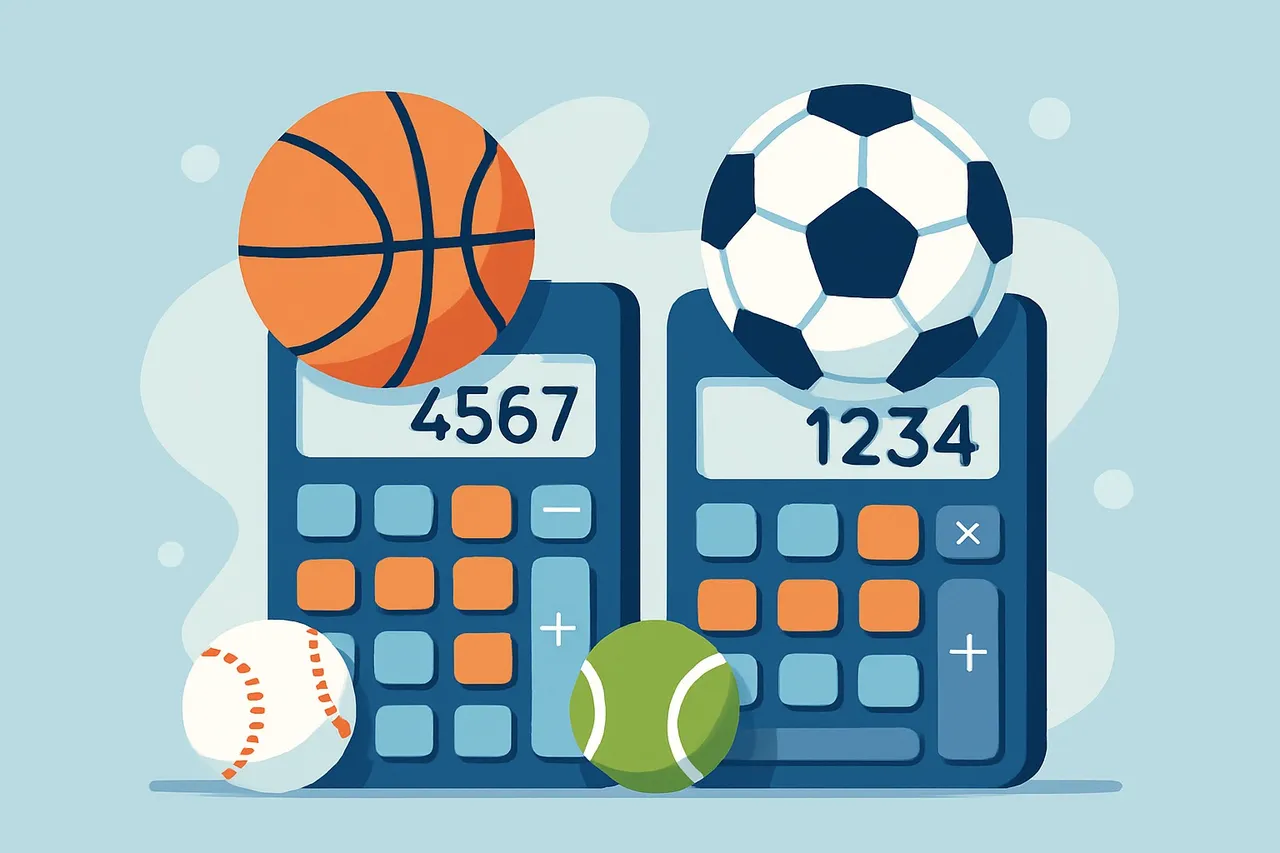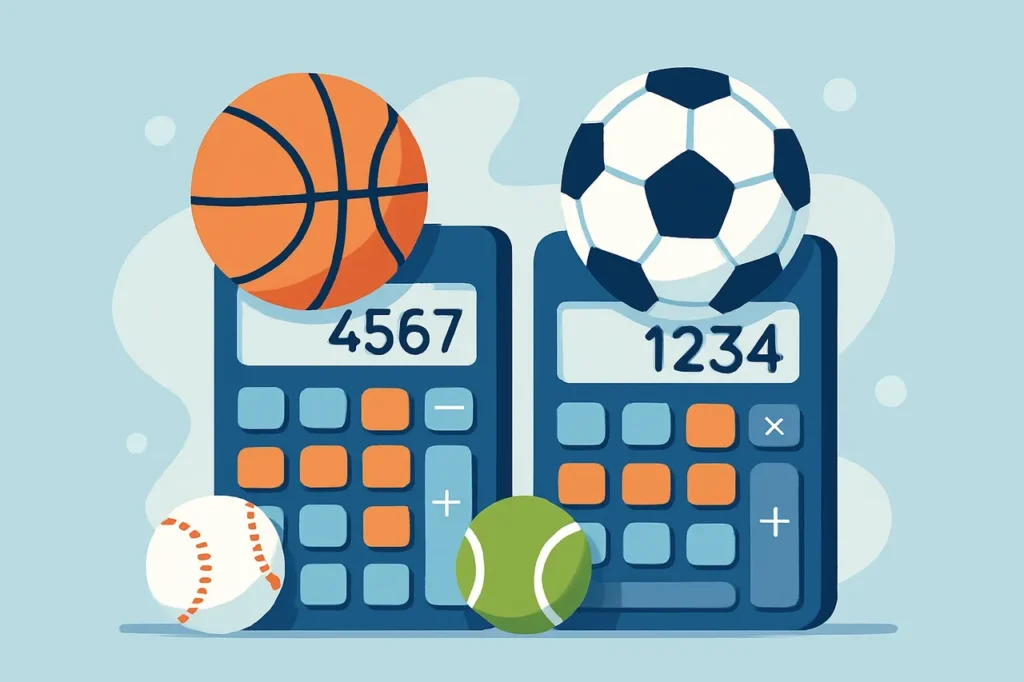
Sports Calculators
Fitness & Sports Calculators
Transform your training with our complete suite of fitness and sports calculators. Whether you’re training for a marathon, tracking calories burned during workouts, or monitoring your cardiovascular fitness, our calculators provide accurate, instant results to help you reach your goals faster.
From beginner walkers to elite athletes, these tools help you measure performance, plan workouts, set realistic targets, and track progress across running, cycling, swimming, and strength training.
Running Calculators
Optimize your running performance with pace, distance, and calorie calculators designed for runners of all levels. Calculate split times, predict race finish times, and track your running efficiency.
- Running Pace Calculator – Calculate your pace per mile or kilometer
- Marathon Pace Calculator – Plan your marathon race strategy
- Steps to Kilometers Calculator – Convert daily steps to distance
Cardiovascular & Endurance Metrics
Monitor your heart health and aerobic capacity with calculators that measure cardiovascular fitness, training zones, and endurance levels essential for athletic performance.
- VO2 Max Calculator – Measure aerobic fitness capacity
- Maximum Heart Rate Calculator – Determine training heart rate zones
Calorie & Energy Expenditure
Track calories burned during exercise and daily activities. Understand your energy expenditure to manage weight, fuel workouts properly, and optimize nutrition timing.
- Walking Calorie Calculator – Calculate calories burned while walking
- Steps to Calories Calculator – Convert step count to calories burned
Cycling & Biking
Enhance your cycling training with calculators for pace, speed, and calorie burn specific to road cycling, mountain biking, and indoor cycling workouts.
- Bike Pace Calculator – Calculate cycling speed and pace
- Calories Burned Biking Calculator – Track cycling energy expenditure
Swimming & Water Sports
Improve swimming technique and training with pace calculators and calorie trackers designed for pool and open water swimming.
- Swimming Pace Calculator – Calculate swim pace per 100m/100y
- Swimming Calorie Calculator – Estimate calories burned swimming
Body Composition & Weight Management
Assess body composition, set weight goals, and track changes with calculators for BMI, body fat percentage, and metabolic rate.
- BMI Calculator for Women – Calculate body mass index
- BMR Calculator – Determine basal metabolic rate
- FFMI Calculator – Assess fat-free mass index
Strength Training
Calculate one-rep max, track strength gains, and plan progressive overload for powerlifting and strength training programs.
- Bench Press Calculator (1RM) – Find your one-rep maximum
Specialized Activities
Calculators for specific sports and activities including nordic walking and other specialized training disciplines.
- Nordic Walking Calculator – Calculate nordic walking pace and calories
Why Use Fitness Calculators?
Fitness calculators eliminate guesswork from training. Instead of relying on generic recommendations, you get personalized metrics based on your age, weight, height, and current fitness level. This precision helps prevent overtraining, ensures adequate recovery, and accelerates progress toward specific goals.
Athletes use these tools to structure training plans, adjust workout intensity, and monitor improvements over time. Whether you’re preparing for a 5K race, trying to lose weight, or building strength, calculators provide objective data that guides smart decision-making.
Accurate Training Zones
Heart rate and pace calculators help you train in the correct intensity zones. Training too hard leads to burnout and injury, while training too easy produces minimal adaptation. Our calculators identify your optimal training zones for:
- Fat burning
- Aerobic development
- Anaerobic capacity
Progress Tracking
Regular use of fitness calculators creates a quantifiable record of improvement. Track how your VO2 max increases, running pace improves, or body composition changes month by month. This data-driven approach keeps motivation high and shows which training methods work best for your physiology.
Goal Setting & Planning
Use calculators to set realistic, achievable goals. If you want to run a sub-4-hour marathon, pace calculators show exactly what per-mile pace you need to maintain. Calorie calculators reveal how much energy deficit creates sustainable weight loss without sacrificing performance.
Nutrition Optimization
Understanding calories burned during training helps match nutrition intake to activity level. Endurance athletes need to fuel appropriately for long sessions, while those focused on weight loss benefit from knowing their true energy expenditure.
Our calculators use validated formulas from sports science research, ensuring accuracy and reliability. All tools are free to use, require no registration, and work on any device. Start calculating your fitness metrics now and take control of your athletic development.
🚀 Pro Tips for Maximum Calculator Accuracy
Ensure Precise Input Measurements
Body Weight:
- Weigh at same time daily (morning after bathroom, before eating/drinking)
- Use digital scale accurate to 0.1 lb/0.05 kg
- Track 7-day average to account for daily fluctuations (±2-5 lbs normal)
- Factors causing temporary weight spikes: high sodium meal, intense exercise (inflammation), hormonal changes, dehydration
Height:
- Measure without shoes against flat wall
- Stand heel-to-head straight, look forward (not up/down)
- Have someone mark wall at top of head
- Height can decrease 0.5-1 inch throughout day (spine compression); measure morning
Body Fat Percentage: If calculator requires body fat input:
- Use consistent measurement method (same caliper sites, same scale)
- Morning measurements before eating are most consistent
- Professional assessments: DEXA scan (±2% accurate), hydrostatic weighing (±2.5%), BodPod (±3%)
- Home methods: bioelectrical impedance scales (±5-8%), skinfold calipers (±4-6%)
Resting Heart Rate:
- Measure first thing upon waking, before getting out of bed
- Count pulse for 60 seconds (or 30 seconds × 2)
- Take 3 consecutive mornings, average the results
- Lower RHR indicates better cardiovascular fitness (athlete: 40-60 bpm; average: 60-80 bpm)
Activity Level Multipliers: Choose honestly—overestimating burns leads to weight gain:
Extra Active (1.9): Physical job + intense training, athlete in heavy training phase
Sedentary (1.2): Office job, minimal walking, no intentional exercise
Lightly Active (1.375): Light exercise 1-3 days/week or 3,000-5,000 daily steps
Moderately Active (1.55): Moderate exercise 3-5 days/week or 7,500-10,000 steps
Very Active (1.725): Hard exercise 6-7 days/week or 12,500+ steps + training
Understand Calculator Limitations and Ranges
When calculators underestimate:
- High muscle mass individuals: Athletes, bodybuilders may need +10-20% more calories than calculated
- Young adults (teens, early 20s): Metabolism 5-10% higher than equations predict
- Highly active people: Intense daily activity may exceed calculator’s “very active” category
- Cold climates: Thermoregulation in cold requires +5-10% additional calories
When calculators overestimate:
- Sedentary lifestyle with low NEAT: Minimal non-exercise activity thermogenesis
- Older adults (65+): Metabolism may be 10-15% lower than calculated
- Previous diet history: Metabolic adaptation from repeated dieting can lower metabolism 5-20%
- Medical conditions: Hypothyroidism, PCOS, insulin resistance reduce calorie needs
- Efficient movers: Long-term athletes burn fewer calories due to movement economy
Strategic Calculator Combinations for Comprehensive Analysis
Complete Body Composition Assessment
Full analysis sequence:
Step 1: BMI Calculator
- Quick initial assessment of weight status
- Identifies if you’re underweight, healthy, overweight, or obese
- Takes 30 seconds to complete
Step 2: Body Fat Calculator
- More accurate than BMI alone
- Distinguishes muscle vs. fat weight
- Requires caliper measurements or body fat scale
- Athletes may show high BMI but healthy body fat %
Step 3: FFMI Calculator (Fat-Free Mass Index)
- Assesses muscle mass relative to height
- Helps determine if weight gain is muscle or fat
- Shows genetic muscle-building potential
- Target: FFMI 19-21 (women), 23-25 (men) = good muscularity
Step 4: BMR Calculator
- Reveals base metabolic rate influenced by muscle mass
- Higher muscle = higher metabolism at rest
- Shows calorie burn even on rest days
Comprehensive insight:
- All four metrics together reveal true body composition
- Identifies if fat loss, muscle gain, or both are needed
- Tracks changes beyond scale weight (muscle gain + fat loss = same weight, better body)
- Recalculate full sequence every 4-6 weeks
When to Seek Professional Assessment Beyond Calculators
Medical and Health Conditions Requiring Expert Guidance
Cardiovascular concerns:
- Heart disease or history: Abnormal EKG, previous heart attack, stent/bypass surgery
- High blood pressure (≥140/90): Uncontrolled hypertension
- Arrhythmias: Irregular heartbeat, palpitations during exercise
- Chest pain/discomfort: During activity or at rest
- Shortness of breath: Disproportionate to activity level
Action: Obtain medical clearance before starting exercise program; stress test may be required
Metabolic disorders:
- Diabetes (Type 1 or 2): Blood sugar management during exercise
- Thyroid conditions: Hypo/hyperthyroidism affects metabolism significantly
- Insulin resistance/PCOS: Impacts calorie needs and fat loss rates
- Metabolic syndrome: Combination of high blood pressure, blood sugar, cholesterol
Action: Work with endocrinologist or registered dietitian for personalized targets; calculators may be 15-30% inaccurate
Medication interactions:
- Beta-blockers: Lower heart rate; calculator zones inaccurate
- Stimulants/ADHD meds: Artificially elevate metabolism and heart rate
- Thyroid medications: Affect basal metabolic rate
- Diuretics: Impact hydration and electrolyte balance affecting performance
Action: Consult prescribing physician; may need adjusted formulas or direct monitoring
Pregnancy and postpartum:
- During pregnancy: Calorie needs increase 300-500/day (2nd and 3rd trimester)
- Breastfeeding: Add 300-500 calories above pre-pregnancy needs
- Exercise intensity: Monitor based on perceived exertion, not heart rate (unreliable)
- Pelvic floor considerations: Certain exercises contraindicated
Action: Work with prenatal/postnatal specialist; standard calculators don’t account for pregnancy metabolism changes
Eating disorder history:
- Anorexia, bulimia, binge eating disorder (past or present): Calorie/weight tracking may trigger relapse
- Disordered eating patterns: Obsessive calorie counting, extreme restriction
- Body dysmorphia: Distorted perception of body size/composition
Action: Work with therapist specializing in eating disorders and registered dietitian; avoid calculator use if psychologically harmful
✅ Start Calculating Your Fitness Metrics Now
Ready to take control of your fitness journey with data-driven insights? Scroll up and choose the calculator that matches your immediate goal:
Quick-start recommendations by goal:
- Lose weight: Start with BMR Calculator → Calorie Calculator → track with Steps to Calories
- Build muscle: Begin with FFMI Calculator → BMR Calculator → 1RM Bench Press Calculator
- Improve running: Use VO2 Max Calculator → Running Pace Calculator → Marathon Pace Calculator
- General health: Try BMI Calculator → Body Fat Calculator → Walking Calorie Calculator
All calculators work instantly in your browser—no downloads, no signup, completely free. Get accurate results in seconds and start making informed decisions about your training, nutrition, and wellness today.





